Redditor Questions If It's Right To Refuse To Pay Vet Bills For A Dog Who Got Unintentionally Injured
Accidents of all kinds are unavoidable in life, and determining who is to blame for a mishap can be difficult. However, if you cause an accident and injure someone, you are liable for their medical bills.
A Redditor known as VetBills17 on Reddit found herself in this situation after accidentally injuring a dog while playing soccer. The OP apologized right away, but the dog owner demanded that she pay the vet bills.
Despite the fact that the bill could be afforded, the OP refused because she believed the owner was also wrong and insensitive. The refusal to pay is precisely what will pique your interest in this story.
The OP felt that the dog owner should not have brought the dog so close to a field where they were playing. The OP's friends, on the other hand, blamed her.
The OP wasn't sure how to handle the situation. This prompted the post on the AITA subreddit in order to get other people's opinions.
You'd think that the OP would face backlash from everyone on Reddit, but some of them supported her. Some, however, didn’t support the OP because they believed it was her responsibility to pay the bills.
Readers' reactions to stories like this are always mixed, so we'll let you read the full story below.
The Title

I went to play soccer
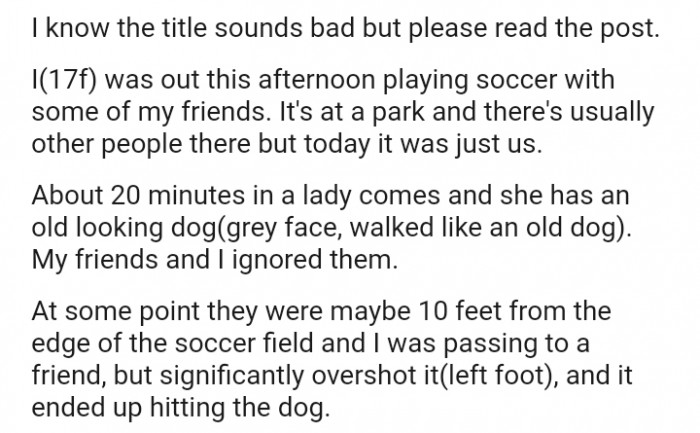
The owner and the dog were not paying attention
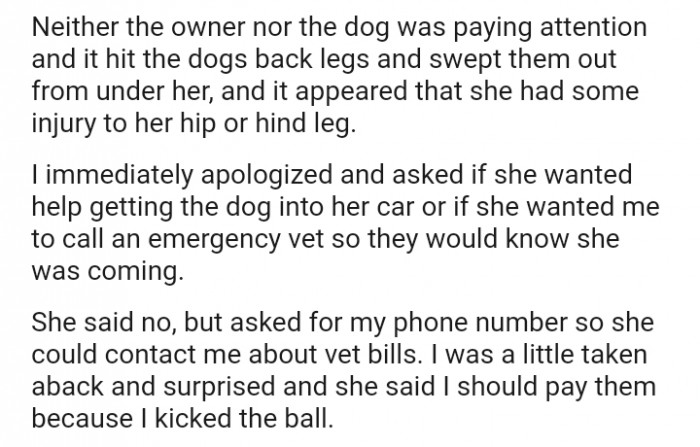
Exploring Ethical Considerations
The ethical dilemma surrounding the responsibility of pet ownership is a complex issue that intersects with psychological principles of accountability and attachment. According to Dr. Jennifer McMahon, a behavioral psychologist, pet owners often experience a strong psychological bond with their animals, which can lead to feelings of guilt or obligation when faced with financial decisions regarding their care.
This bond can create internal conflict, particularly when considering the welfare of the pet versus financial constraints. Research shows that the psychological principles of cognitive dissonance come into play, where individuals struggle to reconcile their values with their actions, impacting their decision-making process.
Exploring Ethical Dilemmas in Pet Ownership
Dr. Emily Hart, a veterinarian and psychologist, highlights the complex ethical considerations that arise when discussing financial responsibility for veterinary care. She notes that pet ownership often entails both emotional and financial commitments, which can lead to conflict when unexpected injuries occur.
Research in animal ethics emphasizes that pet owners should prepare for the possibility of unforeseen circumstances, including injuries and illnesses. This preparation includes understanding the financial implications of pet care and having contingency plans in place.
I'm not giving my number to a stranger
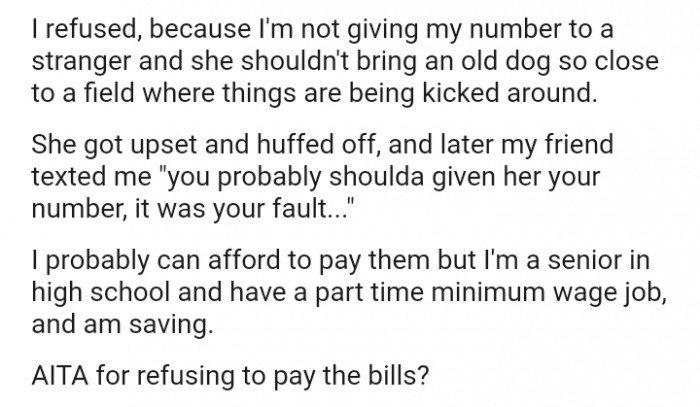
The comments section was in a ruckus as some supported the OP, some were against her, and the rest couldn't decide who was wrong or right. Read some of the comments for yourself below.
1. You should at least pay something

2. She has an assumption of risk
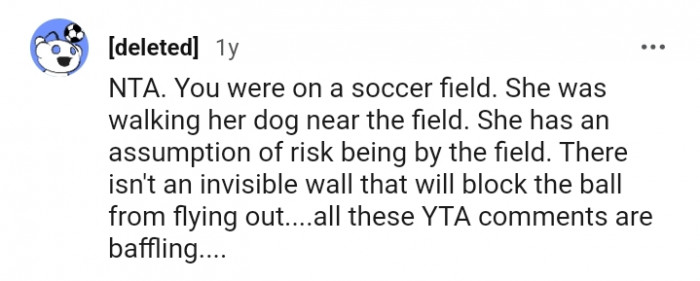
Moreover, the situation highlights the concept of 'moral distress,' which occurs when individuals feel compelled to act in ways that contradict their values or ethical beliefs. A study published in the Journal of Medical Ethics indicates that moral distress can lead to anxiety and emotional turmoil, making it crucial for individuals to have frameworks in place for making difficult ethical decisions.
When faced with such dilemmas, individuals can benefit from discussions with mental health professionals who can offer strategies to cope with the emotional weight of these decisions and facilitate a clearer understanding of their values.
A clinical psychologist specializing in family dynamics points out that conflicts over financial responsibilities can often reflect deeper relational issues. Often, these issues stem from differing values about money, responsibility, and care for animals.
According to studies on interpersonal relationships, such disagreements can lead to significant stress and feelings of resentment if not addressed openly. It’s critical for pet owners to communicate their expectations and boundaries regarding financial responsibilities before complications arise.
3. I don't take my dog to parks anymore
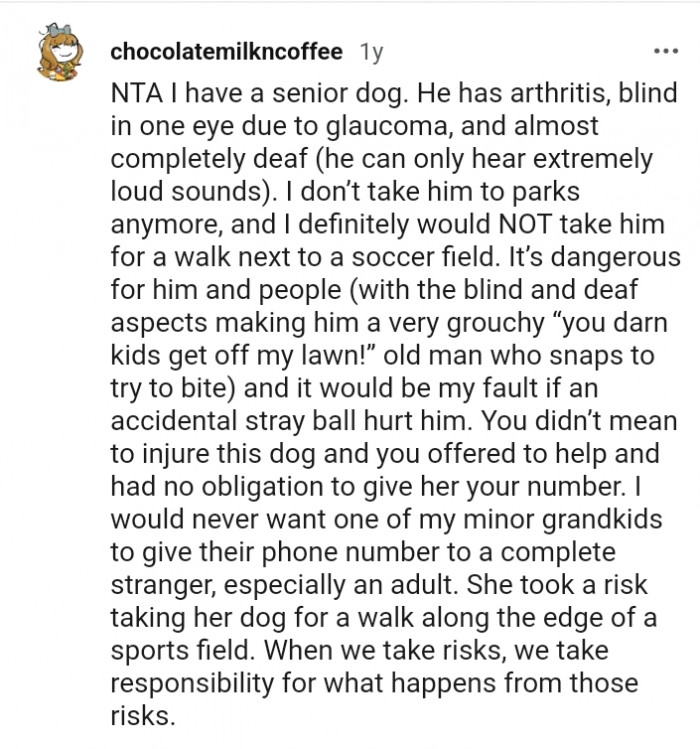
4. Calculating comparative negligence or assumption of risk
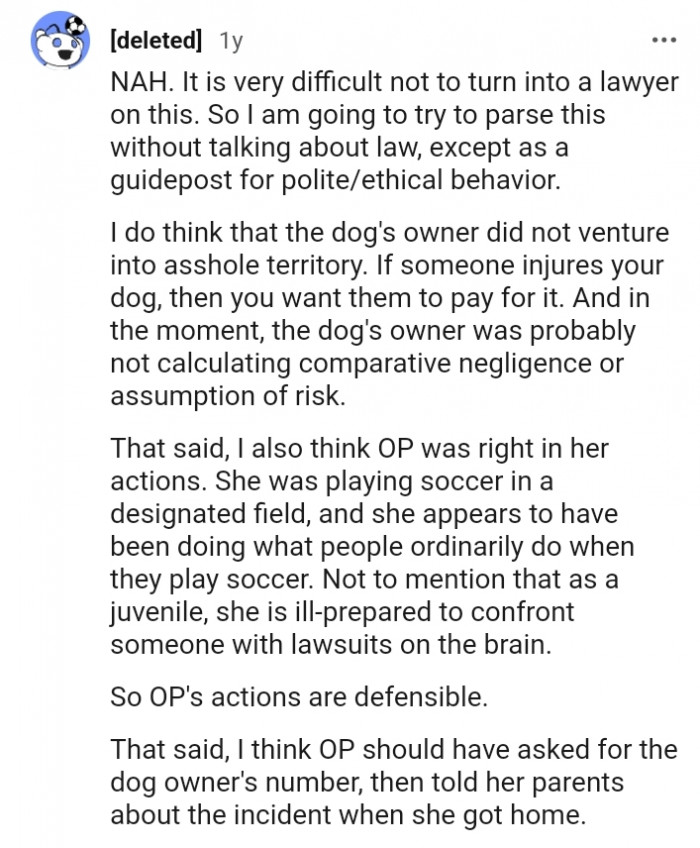
5. "Don't drive close to the road"
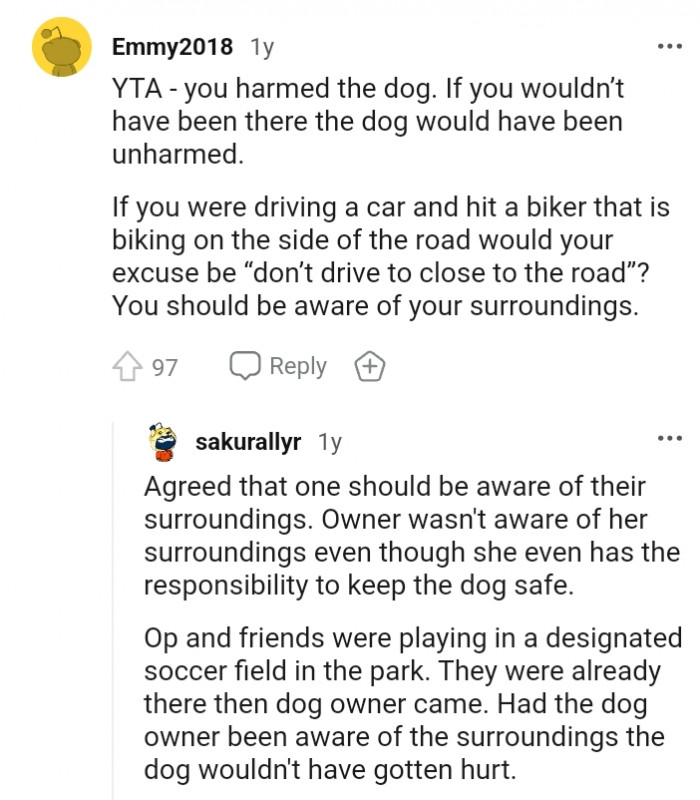
Impact of Financial Stress on Decision-Making
Financial stress plays a significant role in decision-making regarding pet care, as highlighted by Dr. Amy Smith, a financial psychologist. Her research suggests that financial strain can lead to decreased cognitive functioning and emotional regulation, making it harder for individuals to make rational decisions.
When individuals are under financial pressure, their focus often shifts to immediate survival needs, which can overshadow the long-term considerations of pet ownership. Understanding this dynamic can help pet owners recognize the external factors influencing their choices and seek support in managing their financial and emotional well-being.
Understanding Emotional Responses to Pet Injuries
Research in emotional psychology indicates that pet owners often experience intense feelings of guilt and anxiety when their animals are injured. These feelings can be exacerbated by societal expectations to provide immediate and comprehensive care for pets.
Studies suggest that this emotional turmoil can lead to irrational decision-making, creating a cycle of stress that complicates the situation further. Understanding these emotional triggers can help owners navigate their responses more productively.
6. The dog owner is responsible for her dog
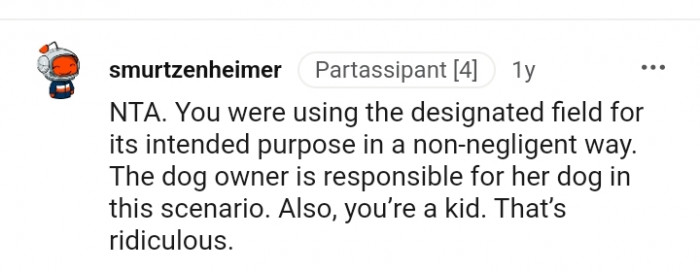
7. What if your ball had damaged a parked car?
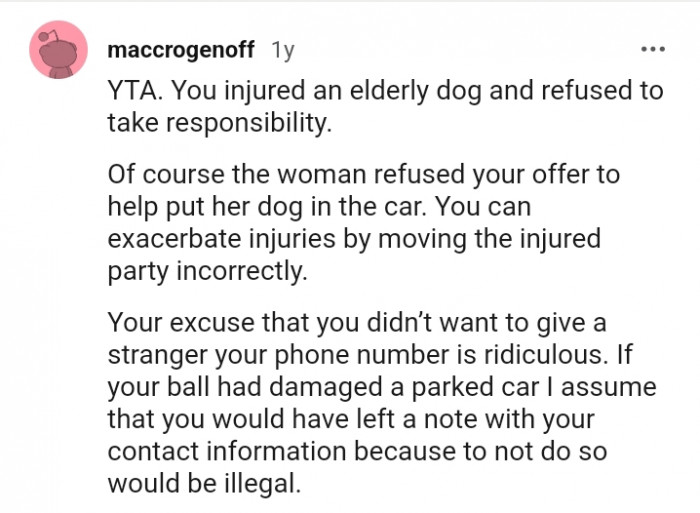
8. You even apologized and offered to help
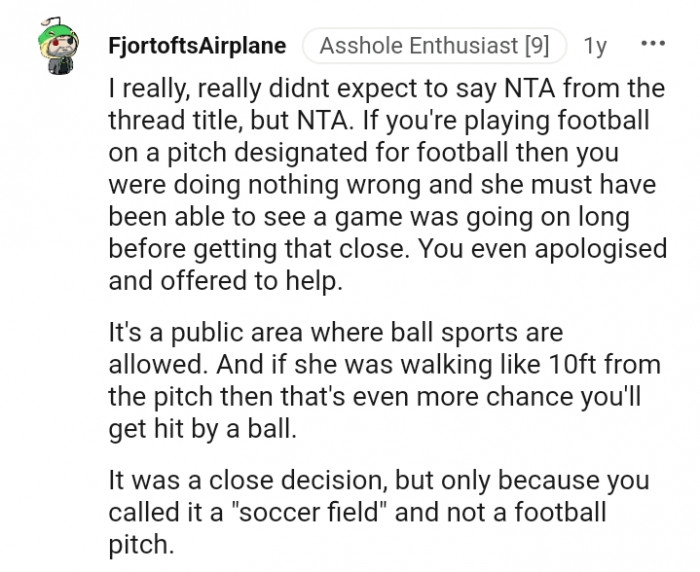
Practical solutions include establishing a pet care budget and exploring community resources that provide financial assistance for veterinary care. Engaging in proactive financial planning can alleviate some of the stress associated with unexpected expenses, allowing pet owners to make decisions that align with their values without compromising their financial stability.
Additionally, open discussions with family members or partners about financial responsibilities can lead to shared decision-making and reduce the burden on a single individual, fostering a supportive environment for navigating these challenges.
Behavioral analysis shows that pet owners may project their emotions onto their pets, interpreting their injuries as personal failures. This projection is a common psychological defense mechanism that can complicate emotional responses to pet care. Understanding this behavior is crucial for owners to avoid extreme reactions.
Research indicates that developing emotional regulation skills can help pet owners respond more constructively. For example, mindfulness practices can facilitate better emotional processing and decision-making during crises.
9. That is what dog parks are for
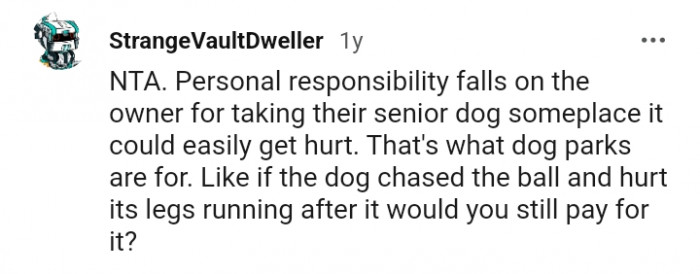
10. She had the right to be there

11. You were at the park and people play at parks

Practical Solutions for Conflict Resolution
Experts suggest that establishing clear communication and understanding around pet care responsibilities can mitigate conflicts. Having open discussions about financial limits and care expectations before adopting a pet is crucial.
Moreover, creating a shared budget for pet care can help alleviate tensions. Research shows that when partners collaborate on financial decisions, it enhances relationship satisfaction and reduces conflict.
12. This Redditor is kind of half and half on this
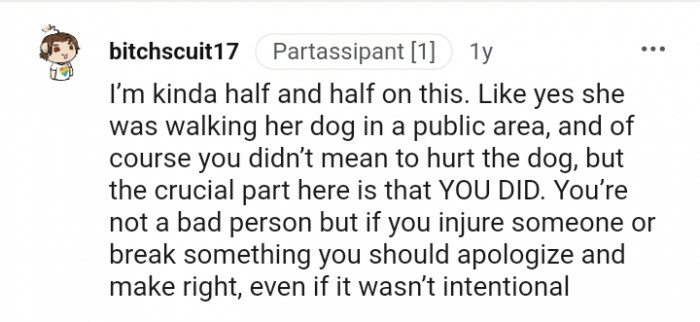
13. An info was asked of and the OP gave a reply
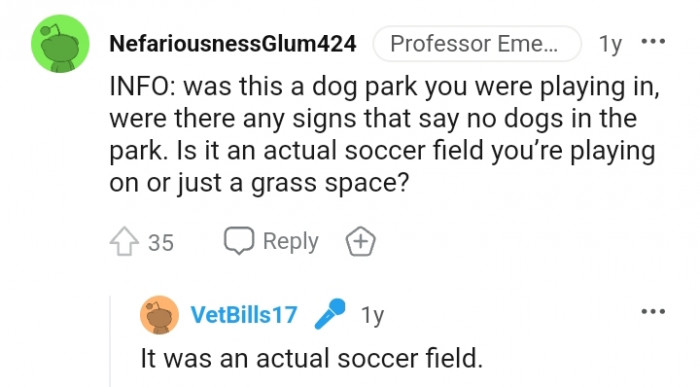
14. It is not the a**hole for this Redditor

In situations where disagreements arise, seeking a neutral third party, such as a mediator or counselor, can be beneficial. This professional can assist in clarifying values and finding common ground. According to psychological research, mediation can lead to more amicable resolutions when parties feel heard and understood.
Furthermore, fostering empathy and understanding each other's perspectives will enrich discussions and lead to more positive outcomes.
15. I would not expect anyone to pay

16. Coming from a dog owner who walks their dog on different fields
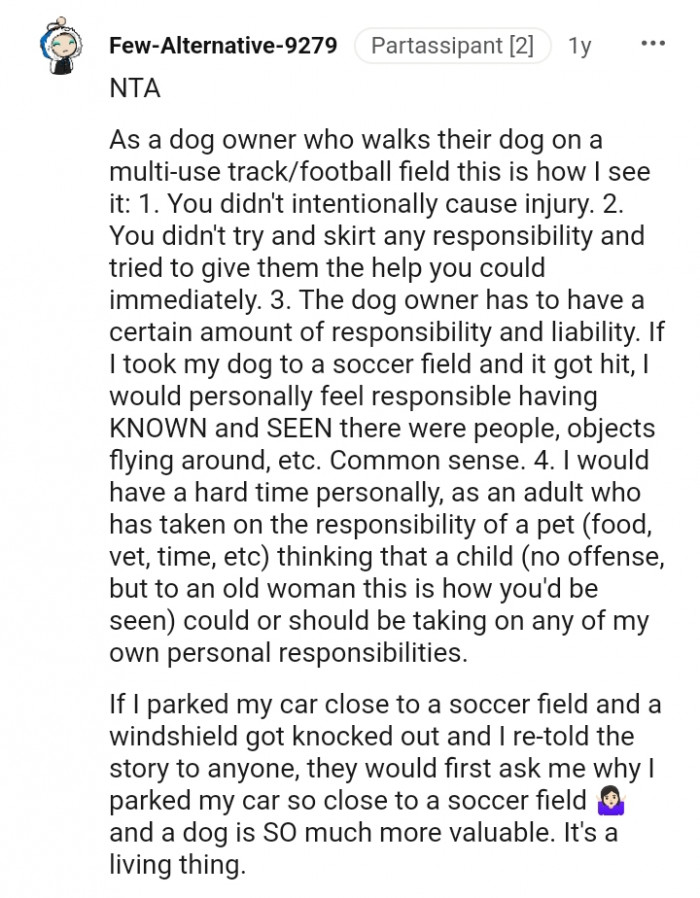
17. The dog is an actual living being
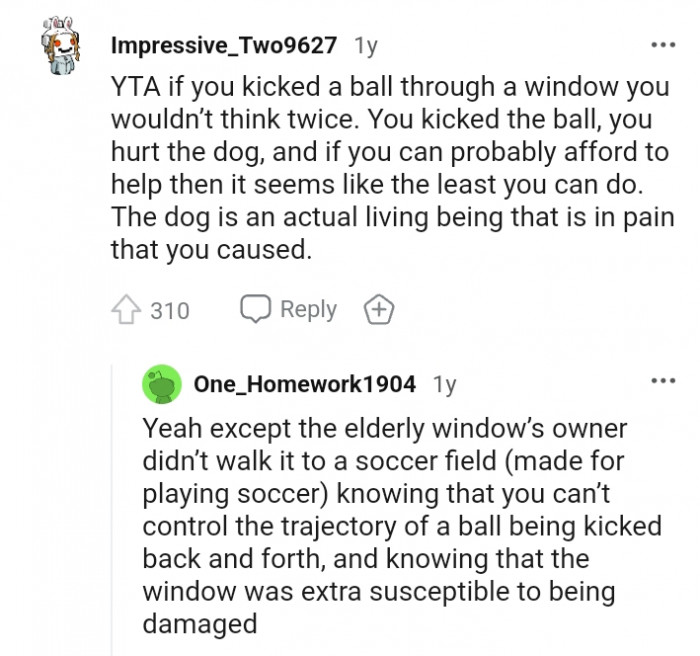
The Role of Guilt and Responsibility in Pet Care
The psychological concept of guilt often plays a significant role in how pet owners respond to their animal's injuries. This guilt can stem from perceived failures to protect or adequately care for their pets.
Research shows that guilt can motivate behavior change but can also lead to avoidance and conflict if not managed appropriately. Understanding the dual nature of guilt can help owners process their feelings in a healthier way.
18. Why weren't you paying attention to them?
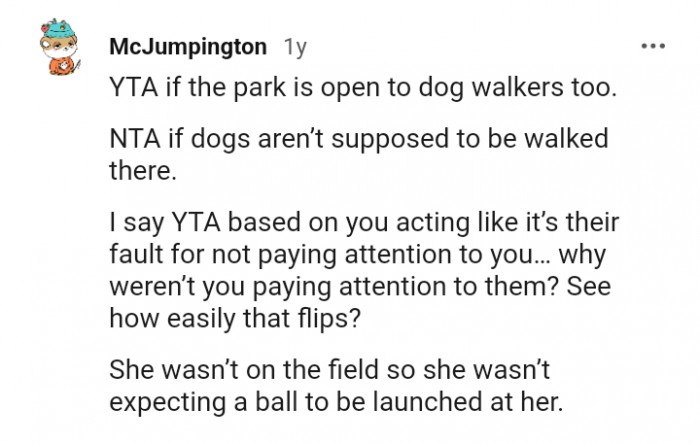
19. You didn't set out to hit a dog
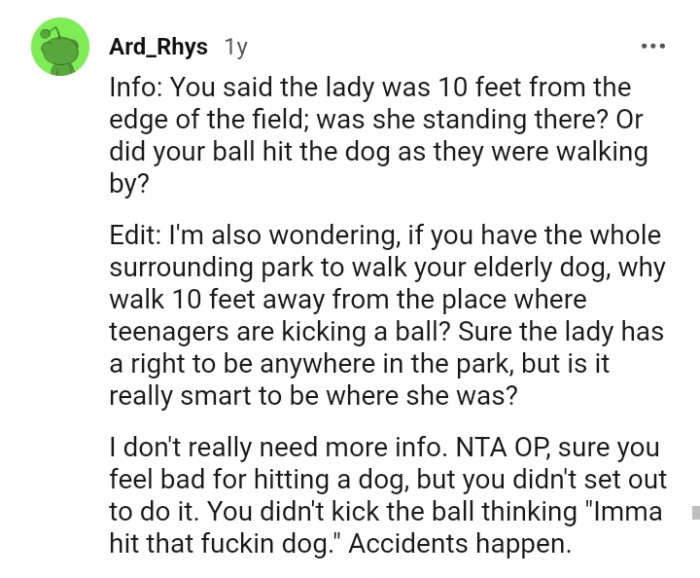
20. You weren't being irresponsible playing soccer
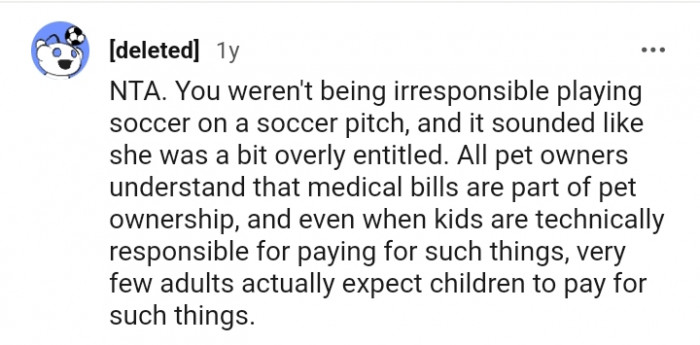
Addressing these feelings through self-reflection and communication is vital. Pet owners should remind themselves that accidents can happen despite precautions. Acknowledging this reality can help alleviate guilt and foster a more rational approach to the situation.
Additionally, engaging in supportive conversations with friends or fellow pet owners can provide crucial emotional support.
While it is difficult for each party in an accident situation to accept being at fault, at some point, someone or both parties ultimately have to accept the responsibilities of repairs. Minor expenses can be overlooked, but surely big expenses like vet bills cannot be overlooked so easily.
We know you have your own reactions to this matter. Let us know what your opinions are in the comments section below.
Psychological Analysis
This situation highlights the complex interplay between emotional attachment and financial responsibility. Pet owners often face internal conflicts when making decisions about care, which can lead to stress and anxiety. It's crucial to approach these dilemmas with empathy and open communication, recognizing that these feelings are valid and common among pet owners.
Analysis generated by AI
Analysis & Alternative Approaches
In summary, understanding the emotional and ethical dimensions surrounding pet ownership, particularly during crises, is essential. Effective communication and emotional processing can mitigate conflicts and enhance the relationship between pet owners and their pets.
Behavioral specialists affirm that preparing for unexpected situations can lead to healthier dynamics and a more fulfilling experience as a pet owner.
Analysis & Alternative Approaches
In conclusion, the intersection of ethics, financial stress, and emotional bonds in pet ownership presents complex challenges that require careful navigation. As Dr. William Doherty, a family therapist, states, "Navigating the emotional landscape of pet ownership involves recognizing the deep bonds we share with our animals, which can complicate financial decisions." Understanding and addressing these psychological factors can lead to healthier decision-making processes. Ultimately, fostering open communication and seeking support, as emphasized by Dr. Alexandra Solomon, a relationship therapist, can help pet owners align their decisions with their values while managing the associated emotional and financial pressures.



